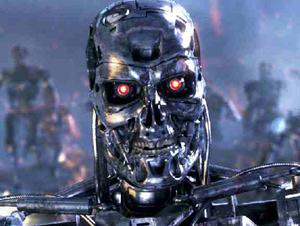“Terminator Salvation” and our romance with robots
The following is not a full transcript; for full story, listen to audio.
"Terminator Salvation," the fourth installment of the "Terminator" franchise, takes place in 2018, an apocalyptic world where humans are outnumbered by machines — hulking robots, the size of skyscrapers, with a penchant for wiping out mankind. And don't even get us started on SkyNet. But what about year 2009?
On "The Takeaway," Sherry Turkle gives us a reality check on human-robot relations. She is a professor of Science, Technology and Society and MIT, where she is also the founder and director of the MIT Initiative on Technology and Self. She is an author of numerous books, among them is her latest title, "Simulation and Its Discontents."
Professor Turkle's interest lies in how robots can become a part of our social life: "The robots I study, and the robots that I think are really worth turning our attention to because they tell us so much about ourselves, are the robots called sociable robots, or relational robots; and these are robots — mostly at this point developed in Japan — that are trying to take jobs as … robo nannies, as robo baby sitters, as robo elder care, as robo therapists, as robo receptionists.
"And these are robots that really are there with only one purpose, not to do something for you, but to do something to you — and that is to form a relationship with you. So that you can confide in it, so that it can be a kind of counselor, so that it can be a buddy. And having robots as part of our social life, and designing robots to be part of our social life, I find that a very compelling question … why, what it's going to do with us, what kind of social life is possible with robots."
She thinks robots are a reflection on how we view relationships: "For example, you may remember the IBO Dog, the Sony Household Entertainment robot that looked like a mechanical dog, and you can teach it tricks and stuff like that. And I interviewed one woman about IBO, and she said, 'It's better than a real dog. It won't do dangerous things, it won't betray you, and it won't die suddenly and make you really sad.'"
As for the difference between the sci-fi narrative of robots — as evil and powerful; and the real world narrative of robots — as caregivers and helpers — Professor Turkle says: "I think the key is … we really have a limited amount of technology that really can make an autonomous kind of, iron man, Terminator-style robot; but what we do have is our psychologies and our vulnerability.
"And what robot designers have done, very cleverly, is to design robots that look you in the eye, make a gesture in your direction, track your movement, recognize that its you — perhaps know your name — these are not hard technical things, and when that happens, it's our psychology, our vulnerability that kicks in, and we're toast when that happens. We feel as though there is ascension there, there is even a caring presence there. So part of the reason that the actual robots on the ground are these empathic robots, is that they are leveraging off our vulnerability. I almost think of it as kind of Darwinian signals — that if you look at me in the eye and gesture in my direction … a Darwinian button is pushed that I feel as though I'm talking to an 'other,' a kindred spirit."
"The Takeaway" is a national morning news program, delivering the news and analysis you need to catch up, start your day, and prepare for what’s ahead. The show is a co-production of WNYC and PRI, in editorial collaboration with the BBC, The New York Times Radio, and WGBH.
